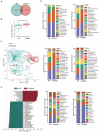Unravelling the role of gut microbiota in acute pancreatitis: integrating Mendelian randomization with a nested case-control study
- PMID: 39021624
- PMCID: PMC11253135
- DOI: 10.3389/fmicb.2024.1401056
Unravelling the role of gut microbiota in acute pancreatitis: integrating Mendelian randomization with a nested case-control study
Abstract
Background: Gut microbiota may influence the development of acute pancreatitis (AP), a serious gastrointestinal disease with high morbidity and mortality. This study aimed to identify a causal link by investigating the relationship between gut microbiota and AP.
Methods: Mendelian randomization (MR) and a nested case-control study were used to explore associations between gut microbiota composition and AP. 16S rRNA sequencing, random forest modelling (RF), support vector machine (SVM), and Kaplan-Meier survival analysis was applied to identify significant gut microbiota and their correlation with hospitalization duration in AP patients.
Results: Bidirectional MR results confirmed a causal link between specific gut microbiota and AP (15 and 8 microbial taxa identified via forward and reverse MR, respectively). The 16S rRNA sequencing analysis demonstrated a pronounced difference in gut microbiota composition between cases and controls. Notably, after a comprehensive evaluation of the results of RF and SVM, Bacteroides plebeius (B. plebeius) was found to play a significant role in influencing the hospital status. Using a receiver operating characteristic (ROC) curve, the predictive power (0.757) of B. plebeius. Kaplan-Meier survival analysis offered further insight that patients with an elevated abundance of B. plebeius experienced prolonged hospital stays.
Conclusion: Combining MR with nested case-control studies provided a detailed characterization of interactions between gut microbiota and AP. B. plebeius was identified as a significant contributor, suggesting its role as both a precursor and consequence of AP dynamics. The findings highlight the multifactorial nature of AP and its complex relationship with the gut microbiota. This study lays the groundwork for future therapeutic interventions targeting microbial dynamics in AP treatment.
Keywords: Bacteroides plebeius; Mendelian randomization; acute pancreatitis; gut microbiota; nested case–control study.
Copyright © 2024 Qu, Lu, Chen, Li, Xu and Li.
Conflict of interest statement
The authors declare that the research was conducted in the absence of any commercial or financial relationships that could be construed as a potential conflict of interest.
Figures





References
-
- Al-Bataineh M. M., Kinlough C. L., Marciszyn A., Lam T., Ye L., Kidd K., et al. . (2023). Influence of glycoprotein MUC1 on trafficking of the Ca2+-selective ion channels, TRPV5 and TRPV6, and on in vivo calcium homeostasis. J. Biol. Chem. 299:102925. doi: 10.1016/j.jbc.2023.102925, PMID: - DOI - PMC - PubMed
-
- Bertin N., Tan J., Li Z., Gonzalez-Porta M., Rajaby R., Jimenez R., et al. . A catalogue of structural variation across ancestrally diverse Asian genomes. (2023). [Preprint] https://www.researchsquare.com/article/rs-3376868/v1 (Accessed October 3, 2023).
-
- Camacho Leal M. D. P., Costamagna A., Tassone B., Saoncella S., Simoni M., Natalini D., et al. . (2018). Conditional ablation of p130Cas/BCAR1 adaptor protein impairs epidermal homeostasis by altering cell adhesion and differentiation. Cell Commun. Signal 16:73. doi: 10.1186/s12964-018-0289-z, PMID: - DOI - PMC - PubMed
LinkOut - more resources
Full Text Sources

